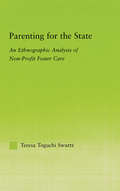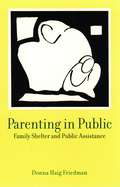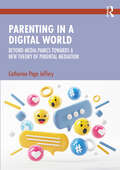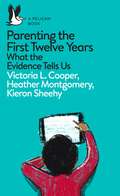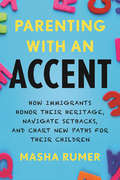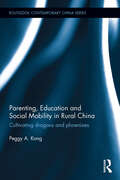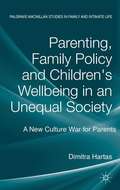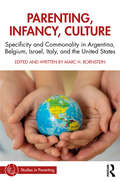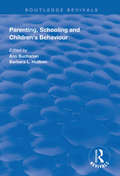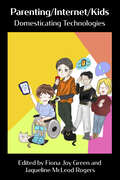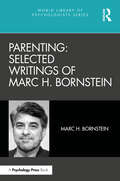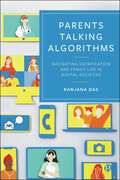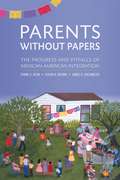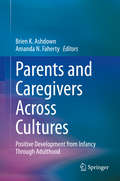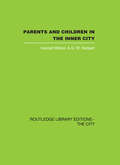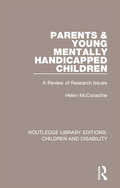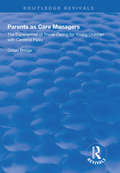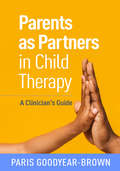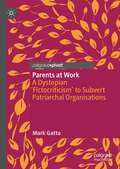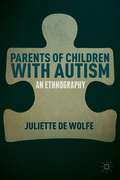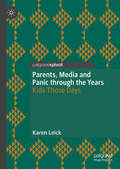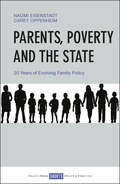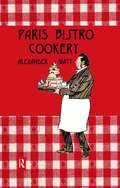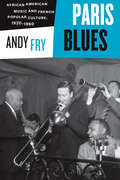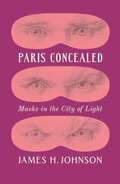- Table View
- List View
Parenting for the State: An Ethnographic Analysis of Non-Profit Foster Care (New Approaches In Sociology Ser.)
by Teresa Toguchi SwartzThrough careful ethnography and rich in-depth interviews at a non-profit foster family agency, this book takes a look behind the scenes of our troubled foster care system.
Parenting in Public: Family Shelter and Public Assistance
by Donna Haig FriedmanWhen parents must rely on public assistance and family shelters to provide for their children's most basic needs, they lose autonomy. Within a system of public assistance that already stigmatizes and isolates its beneficiaries, their family lives become subject to public scrutiny and criticism. They are parenting in public.This book is an in-depth examination of the realities of life for parents and their children in family shelters. The author uses the Massachusetts family shelter system to explore the impact of asset and deficit-oriented help-giving approaches as they are experienced by mothers and service providers.The format of the book is unique. Following each chapter are the "reflections" of a mother who has parented in a shelter, a front-line worker, and a shelter director. The author and contributors propose a "Power With" policy and practice framework that runs counter to the prevailing "Power Over" cultural policy trends.Contributors include Rosa Clark, Brenda Farrell, Deborah Gray, Michele Kahan, Margaret A. Leonard, Mary T. Lewis, Nancy Schwoyer, and Elizabeth Ward.
Parenting in a Digital World: Beyond Media Panics Towards a New Theory of Parental Mediation
by Catherine Page JefferyThis book focuses on the challenges of parenting in the digital age, providing a counter-narrative to, and critique of, risk and cyber safety narratives, as well as some suggestions for a way forward.Drawing on qualitative research with Australian families, this book explores the knowledges, practices, anxieties and lived experiences of families themselves. It demonstrates that the realities of family life in the digital age are more complex than the headlines and cyber safety advice would have us believe, as parents grapple with balancing their own anxieties and social expectations about what it means to be a ‘good’ parent, with the practices, desires, and rights of their child. It addresses key questions including: How much attention should we pay to media headlines about the dangers of contemporary media? What is actually worrying Australian parents and how do they address these concerns? Why do young people love media so much? How capable are young people of actually managing online risk? What is the right way to parent in the digital age to ensure young people’s safety and wellbeing while minimising family conflict?Aimed at media studies scholars and students, as well as parents and policy makers seeking a more comprehensive understanding of the broader academic research surrounding young people, media and parenting, this book argues that parent and child knowledges, practices and experiences must be better accounted for within the online safety ecosystem as well as in policy development, and that families need encouragement and guidance to help them adopt more democratic approaches to parenting in the digital age.
Parenting the First Twelve Years: What the Evidence Tells Us (Pelican Books)
by Heather Montgomery Kieron Sheehy Victoria CooperConcrete, research-driven advice on humanity's oldest, hardest jobWhy is parenting so fraught and so difficult in today's society? There has never been a time when advice was so readily available, and yet there is also a prevailing sense that parents are getting it wrong. This book examines the arguments and counter-arguments supported by research on how best to parent children, from birth to twelve years. By taking an impartial approach to the evidence and, by discussing case studies from across the world and from a number of academic disciplines, this book is designed to show how good parenting comes in many shapes and forms.
Parenting with an Accent: How Immigrants Honor Their Heritage, Navigate Setbacks, and Chart New Paths for Their Children
by Masha RumerMerging real stories with research and on-the-ground reporting, an award-winning journalist and immigrant explores multicultural parenting and identity in the USThrough her own stories and interviews with other immigrant families, Masha Rumer paints a realistic and compassionate picture of what it&’s like for immigrant parents raising a child in America while honoring their cultural identities. Parenting with an Accent incorporates a diverse collection of voices and experiences, giving readers an intimate look at the lives of many different immigrant families across the country. Using empirical data, humor, and on-the-ground reportage, Rumer offers interviews with experts on various aspects of parenting as an immigrant, including the challenges of acculturation, bilingualism strategies, and childcare. She visits a children&’s Amharic class at an Ethiopian church in New York, a California vegetable farm, a Persian immersion school, and more. Deeply researched yet personal, Parenting with an Accent centers immigrants and their experiences in a new country—emphasizing how immigrants and their children remain an integral part of America&’s story.
Parenting, Education, and Social Mobility in Rural China: Cultivating dragons and phoenixes (Routledge Contemporary China Series)
by Peggy A. KongLike many countries around the world, China has been implementing policies aimed at improving parent-school relationships. However, unlike many developed countries, the historical context of family-school relationships has been limited and parents typically do not participate in the school context. Until now, there has been little research conducted in rural China on parental involvement in their children’s education. This book investigates the nature of parental involvement in primary children’s education in rural China by using a combination of quantitative and qualitative methods. It outlines the layered strategies of how rural parents are involved in their children’s schooling, showing that rural parents strongly desire educational success for their children and view education as a means to their children gaining social mobility. It demonstrates that few rural parents engage in visible forms of parental involvement in their children’s schools, such as attending parent-teacher meetings. Rather, they are more likely to engage strategies to support their children’s education which are largely invisible to schools. It adds to the growing body of parental involvement research that suggests that culture, location, and socio-economic status influence different forms of parental involvement, and highlights nuances in invisible forms of parental involvement. Providing insights into how poor rural parents envision their role with their children, schools, and the larger society, and how these relationships can affect the social mobility of students and families, this book will be of huge interest to students and scholars of Asian education, comparative and international education, and Chinese society.
Parenting, Family Policy and Children�s Well-Being in an Unequal Society
by Dimitra HartasThis book examines parenting in an unequal society and questions whether it is a key mechanism through which poverty translates into underachievement and reduced life chances in children.
Parenting, Infancy, Culture: Specificity and Commonality in Argentina, Belgium, Israel, Italy, and the United States (Studies in Parenting Series)
by Marc H. BornsteinThis vital volume advances an in-depth understanding of how parenting infants in the first year of life is similar and different in two contrasting contexts in each of five countries—Argentina, Belgium, Israel, Italy, and the United States—providing a global understanding of parenting across cultures. Edited and written by Marc H. Bornstein and his country collaborators, the chapters presented compare microanalytic approaches to three topical issues in each of two cultural groups in each country. The three issues concern, first, how often and how long mothers in each of the groups in each of the countries engage in basic parenting practices, and how often and how long infants in the same groups engage in different behaviors. Second, whether the maternal parenting practices are organized in any way and whether those infant behaviors are organized in any way. And, third, whether those maternal parenting practices and those infant behaviors are interrelated. Thus, this book offers insights into the basics of parenting and infancy from both intra-cultural and cross-cultural perspectives. Each country chapter is co-authored by a contributor native to the country examined, ensuring an authentic cultural perspectives on parenting and infancy. Together, the chapters provide a broader sample that is more generalizable to a wider range of the world’s population than is typical in most parenting and infancy research. Parenting, Infancy, Culture is essential reading for researchers and students of parenting, psychology, human development, family studies, sociology, and cultural anthropology as well as professionals working with families.
Parenting, Schooling and Children's Behaviour (Routledge Revivals)
by Ann Buchanan Barbara L. HudsonPublished in 1998, this book brings together some of the key findings in parenting and educational programmes from researchers at the University of Oxford, working in primary health care, educational studies, clinical psychology and applied social studies. At a time of considerable changes in family life and society in general, there is concern that some children are not achieving their potential because of emotional and behavioural difficulties. This book looks across the health, education and social divide and highlights what we know and what we don't know about effective strategies in helping children and their parents overcome their difficulties. Each chapter is written by a different member of the centre at Oxford for Research into Parenting and Children and is based on their research.
Parenting/Internet/Kids: Domesticating Technologies
by Fiona Joy Green;Jaqueline McLeod RogersParenting/Internet/Kids, with three key terms slashed together, conveys the idea that the practice of parenting may extend both to the Internet and to our children— to the extent that both require attention, care, and forms of regulation, and, in turn, provide support and enjoyment. While the triadic title is somewhat playful, it also strikes a serious note and introduces layered possibilities: we are not simply raising children who have grown up in the internet age, but also Domesticating Technologies by "managing" the computer (relatively young in age, too, having established itself in homes in the 1980s). Including perspectives from scholars and parents living in Australia, Canada, India, Japan, the UK, and the USA, the collection examines how the intimate presence of computer technology in our homes and on our bodies affects not only mothers and parenting, but family life more broadly.
Parenting: Selected Writings Of Marc H. Bornstein (World Library of Psychologists)
by Marc H. BornsteinIn the World Library of Psychologists series, international experts present career-long collections of what they judge to be their most interesting publications – extracts from books, key articles, research findings, and practical and theoretical contributions. Marc H. Bornstein has published widely in experimental, methodological, comparative, developmental, and cultural science as well as neuroscience, pediatrics, and aesthetics. In this volume, he has collected an integrated series of his papers on parenting. Many disciplines over many centuries have expounded on parenting, but theory and opinion have prevailed. Bornstein initiated efforts to make parenting an evidence-based field of study through his journal Parenting: Science and Practice, the Handbook of Parenting, and two monograph series, Monographs in Parenting and Studies in Parenting. In addition, Bornstein has undertaken empirical studies that address the determinants, nature, scope, and consequences of parenting. The writings selected for this collection symbolize the development of an empirical parenting science and the meaning and importance of parenting for the lives and well-being of children, parents, and society. Including a specially written introduction, in which Marc Bornstein reflects on the importance of parenting and contextualizes both the field and the evolution of his wide-ranging career, this collection will serve as a valuable resource for students and researchers of parenting, developmental science, and all disciplines from anthropology to zoology concerned with nurturing, socializing, and educating the next generation.
Parents Talking Algorithms: Navigating Datafication and Family Life in Digital Societies
by Ranjana DasIn today's digital societies, parenting is shaped by algorithms daily - in search engines, social media, kids' entertainment, the news and more. But how much are parents aware of the algorithms shaping their parenting and daily lives? How can they prepare for children’s futures in a world dominated by data, algorithms, automation and AI? This groundbreaking study of 30 English families sheds light on parents’ hopes and fears, their experiences with algorithms in searching, sharing and consuming news and information, and their awareness and knowledge of algorithms at large. Looking beyond tech skills and media panics, this book is an essential read for social scientists, policy makers and general readers seeking to understand parenting in datafied societies.
Parents Without Papers: The Progress and Pitfalls of Mexican American Integration
by Frank D. Bean James D. Bachmeier Susan K. BrownFor several decades, Mexican immigrants in the United States have outnumbered those from any other country. Though the economy increasingly needs their labor, many remain unauthorized. In Parents Without Papers, immigration scholars Frank D. Bean, Susan K. Brown, and James D. Bachmeier document the extent to which the outsider status of these newcomers inflicts multiple hardships on their children and grandchildren. Parents Without Papers provides both a general conceptualization of immigrant integration and an in-depth examination of the Mexican American case. The authors draw upon unique retrospective data to shed light on three generations of integration. They show in particular that the “membership exclusion” experienced by unauthorized Mexican immigrants—that is, their fear of deportation, lack of civil rights, and poor access to good jobs—hinders the education of their children, even those who are U.S.-born. Moreover, they find that children are hampered not by the unauthorized entry of parents itself but rather by the long-term inability of parents, especially mothers, to acquire green cards. When unauthorized parents attain legal status, the disadvantages of the second generation begin to disappear. These second-generation men and women achieve schooling on par with those whose parents come legally. By the third generation, socioeconomic levels for women equal or surpass those of native white women. But men reach parity only through greater labor-force participation and longer working hours, results consistent with the idea that their integration is delayed by working-class imperatives to support their families rather than attend college. An innovative analysis of the transmission of advantage and disadvantage among Mexican Americans, Parents Without Papers presents a powerful case for immigration policy reforms that provide not only realistic levels of legal less-skilled migration but also attainable pathways to legalization. Such measures, combined with affordable access to college, are more important than ever for the integration of vulnerable Mexican immigrants and their descendants.
Parents and Caregivers Across Cultures: Positive Development from Infancy Through Adulthood
by Brien K. Ashdown Amanda N. FahertyThis book explores diverse parent-child relationships from around the world, drawing on connections between culture and parenting values and challenges. It identifies parenting practices within various countries’ unique historical, political, and cultural backgrounds, reframing parenting as a cultural process whose goals are to encourage culturally-specific child behaviors and outcomes. Chapters focus on parenting research in a range of countries, such as Australia, Bolivia, China, Egypt, Guatemala, India, Rwanda, Namibia, Saudi Arabia, and the United States. Chapters also discuss social, emotional, and physical developmental topics throughout the lifespan, including infancy, early childhood, adolescence, emerging adulthood, and adulthood. Topics featured in this book include: The link between cultural differences in academic success to parents’ academic socialization practices. The impact of culturally-specific parental engagement in positive developmental outcomes in children. Transgender children and their parents. The relationship between religious and secular values and their influence on creating polygamous teenagers. How to implement a micro-cultural lens to studying parent-child relationships during emerging adulthood. Differences and similarities in grandparenting among different cultures. Parents and Caregivers Across Cultures is a must-have resource for researchers, professors, graduate students as well as clinicians, professionals, and policymakers in the fields of developmental and cross-cultural psychology, parenting and family studies, social work, and related disciplines.
Parents and Children in the Inner City
by Harriett Wilson G.W. HerbertThis book was first published in 1978.
Parents and Young Mentally Handicapped Children: A Review of Research Issues (Routledge Library Editions: Children and Disability #10)
by Helen McConachieFirst published in 1986, this book reviews research on the role parents play in fostering the early development of children with mental handicaps. Professionals and parents must work together to give such children the chance of living as ordinary lives as possible and here, the author develops a broadly-based conceptual framework for the involvement of parents as teachers of their young handicapped children. McConachie identifies characteristics of parents which seem of particular relevance to the design and success of intervention programmes. Although written in the 1980s, this book discusses topics that are still important today.
Parents as Care Managers: The Experiences of Those Caring for Young Children with Cerebral Palsy (Routledge Revivals)
by Gillian BridgeFirst published in 1999, this volume examines the inclusion of disabled children as a category of children in need under the Children Act 1989 and as eligible for assessments of need under the NHS and Community Care Act 1990 has drawn renewed attention to the plight of these children and their families. This book presents the findings from a study of parents whose child has cerebral palsy. The research undertaken at the cost of social policy change focuses on the apparent gap between the well-argued proposals for community care and the experiences of carers. A bewildering picture emerges of inadequate services and treatments from the health, education and social services in the public, voluntary and private sectors. Parents experience isolation and stress as they explore ways to improve the quality of their children’s lives by experimenting with unregulated and under-researched treatments for an incurable physical condition. The conclusion that there has been deterioration in provision for these families is a serious indictment on current social policy direction.
Parents as Partners in Child Therapy: A Clinician's Guide (Creative Arts and Play Therapy)
by Paris Goodyear-BrownThis book addresses a key need for child therapists--how to actively involve parents in treatment and give them tools to support their child's healthy development. Known for her innovative, creative therapeutic approach, Paris Goodyear-Brown weaves together knowledge about play therapy, trauma, attachment theory, and neurobiology. She presents step-by-step strategies to help parents understand their child's needs, reflect on their own emotional triggers, set healthy boundaries, make time together more fun, and respond effectively to challenging behavior. Filled with rich clinical illustrations, the volume features 52 reproducible handouts and worksheets. Purchasers get access to a Web page where they can download and print the reproducible materials in a convenient 8 1/2" x 11" size.
Parents at Work: A Dystopian ‘Fictocriticism’ to Subvert Patriarchal Organisations
by Mark GattoThis unique volume uses the innovative methodological approach of dystopian fictocriticism to offer a speculative, critical narrative of parents at work. The author begins with a review of fictocriticism and the blurring of lines between genre and gender scholarship. The book follows a temporally fragmented structure of the past, present and future of parenthood in organisations. Integrating theories of masculinities and gendered hierarchies in organisations, the author uses critical discourse analysis of parental experiences to discuss the reproduction of patriarchal discourse. The dystopian fictocriticism narrative is grounded in empirical research with parents and highlights the structural and cultural barriers they face. The narrative concludes with the subversive potential of caring communities within organisations as a possible future to work towards.This book will be of interest to students and scholars in Gender Studies, Utopia/Dystopia Studies, and Organization Studies.
Parents of Children with Autism
by Juliette De WolfeIn a readable and highly accessible ethnographic account that is shaped by the stories of families and the voices of parents, De Wolfe examines how parents of children with autism navigate the educational and medical systems, understand their own and their children's bodies, and support and educate one another.
Parents, Media and Panic through the Years: Kids Those Days
by Karen LeickThis book analyses articles that appeared in popular periodicals from the 1920s to the present, each revealing the panic that parents and adults have expressed about media including radio, television, video games and the Internet for the last century. Karen Leick argues that parents have continuously shown an intense anxiety about new media, while expressing a romanticized nostalgia for their own youth. Recurring tropes describe concerns about each "addictive" new media: children do not play outside anymore, lack imagination, and may imitate violent or other inappropriate content that they encounter.
Parents, Poverty and the State: 20 Years of Evolving Family Policy
by Naomi Eisenstadt Carey OppenheimNaomi Eisenstadt and Carey Oppenheim explore the radical changes in public attitudes and public policy concerning parents and parenting. Drawing on research and their extensive experience of working at senior levels of government, the authors challenge expectations about what parenting policy on its own can deliver. They argue convincingly that a more joined-up approach is needed to improve outcomes for children: both reducing child poverty and improving parental capacity by providing better support systems. This is vital reading for policymakers at central and local government level as well as those campaigning for the rights of children.
Paris Bistro Cookery
by WattFirst published in 2006. Routledge is an imprint of Taylor & Francis, an informa company.
Paris Blues: African American Music and French Popular Culture, 1920–1960
by Andy FryThe Jazz Age. The phrase conjures images of Louis Armstrong holding court at the Sunset Cafe in Chicago, Duke Ellington dazzling crowds at the Cotton Club in Harlem, and star singers like Bessie Smith and Ma Rainey. But the Jazz Age was every bit as much of a Paris phenomenon as it was a Chicago and New York scene. In Paris Blues, Andy Fry provides an alternative history of African American music and musicians in France, one that looks beyond familiar personalities and well-rehearsed stories. He pinpoints key issues of race and nation in France’s complicated jazz history from the 1920s through the 1950s. While he deals with many of the traditional icons—such as Josephine Baker, Django Reinhardt, and Sidney Bechet, among others—what he asks is how they came to be so iconic, and what their stories hide as well as what they preserve. Fry focuses throughout on early jazz and swing but includes its re-creation—reinvention—in the 1950s. Along the way, he pays tribute to forgotten traditions such as black musical theater, white show bands, and French wartime swing. Paris Blues provides a nuanced account of the French reception of African Americans and their music and contributes greatly to a growing literature on jazz, race, and nation in France.
Paris Concealed: Masks in the City of Light
by James H. JohnsonA comprehensive history of masks in France from the seventeenth to the nineteenth century. Masks can conceal, disguise, or protect. They can guard status, inspire delight, or spread fear. They can also betray trust through insincerity, deceit, and hypocrisy. In Paris Concealed, historian James H. Johnson offers a sweeping history of masks both visible and unseen from the time of Louis XIV to the late nineteenth century, exploring the complex roles that masking and unmasking have played in the fashioning of our social selves. Drawing from memoirs, novels, plays, and paintings, Paris Concealed explores the many domains in which masks have been decisive. Beginning in the court of Versailles, Johnson charts the genesis of courtly politesse and its widespread condemnation by Enlightenment philosophers and political thinkers. He describes strategies deployed in the era of the French Revolution for unmasking traitors and later efforts to penetrate criminal disguises through telltale marks on the body. He portrays the disruptive power of masks in public balls and carnivals and, with the coming of modernity, evokes their unsettling presence within the unconscious. Compellingly written and beautifully illustrated, Paris Concealed lays bare the mask’s transformations, from marking one’s position in a static society to inspiring imagined identities in meritocracies to impeding the elusive search for one’s true self. To tell the history of masks, Johnson shows, is to tell the history of modern selfhood.
